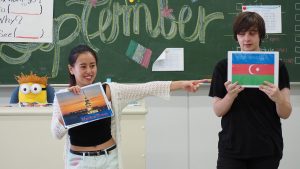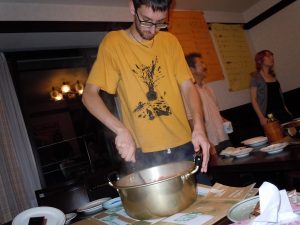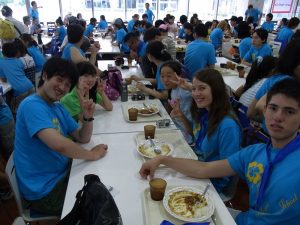History of MSSP
MSSP was planned and carried out by 22 students and two faculty members of Meisei University, located in Hino city, Tokyo, Japan, in 2002. MSSP initially aimed to teach English to local junior high school students at risk. In 2001, a student of Professor Hiromasa Tanaka suggested that it would be beneficial for students to experience authentic teaching before undertaking their official teaching practice. Hiro decided to kick off The Meisei Summer School Project (MSSP). The project was built to save junior high school kids who are unsatisfied with their schools’ English classes and lose interest in learning English.
A community of practice was envisioned in which pre-service teachers and students would come together in a joint enterprise and, in the process, develop a common, socially constructed repertoire of activities in which learning would occur as the participants engaged in the ongoing project. Starting with 38 children from the local community in 2002, MSSP has grown to encompass 71 pre-service teachers and 98 learners from 15 nearby cities and wards in 2008.
Becoming an international volunteer program
MSSP became an international project in 2005. Participation is now open to young people worldwide through an international non-governmental organization, Youth Action for Peace (YAP), and its affiliate, the Council on International Educational Exchange (CIEE).
Through the experiences of MSSP, every participant, both international volunteers and Meisei students, will learn teamwork, leadership, intercultural communication, risk management, and so on. MSSP provides the opportunity to use English for local Japanese children and as a learning site to acquire various knowledge and abilities for International Volunteers and Meisei students.



Theoretical Background of MSSP;
English as a Lingua Franca(EFL)
・English is our important asset to communicate with people all over the world (Firth & Wagner, 1997; Seidlhofer, 2010).
・Current research shows that the number of speakers who use English as a second language is more than twice the number of native speakers of English (Graddle, 2006).
・English as a shared working language in MSSP, you and Meisei students are going to negotiate the meaning.
Communities of Practice
・Communities of practice are groups of people who share a concern or a passion for something they do and learn how to do it better as they interact regularly(Wenger, 2000: Lave & Wenger, 1991).
・MSSP is the place of Communities of Practice. 1st to 4th grader University students and International volunteers work as a team, they share their knowledge, teaching materials and energy.
・Communities of Practice assume that learning is situated in the context of our experience of participation in the world.
・identity is conditioned by social interaction and social structure, that is Communities of Practice.
Identity and Language Learning
Students might think that they will not be related to any situations where English is substantial to function as a member of a community (Norton, 2000; Kanno & Norton, 2003; Block, 2010).
MSSP provides students/pre-service teachers with a lot of opportunities for activities to use English for authentic purposes (Tanaka & Fukada, 2004).
Language Socialization
Language learning is not completed in a classroom segregated from society (van Lier, 2006) .
We try to develop students’ awareness regarding how English is used in our society and why it is necessary to invest our time and effort acquiring English.
code-switching
Code-switching: alternation between two or more languages.
Appropriate code switching is substantial to create an effective multi-cultural team.
